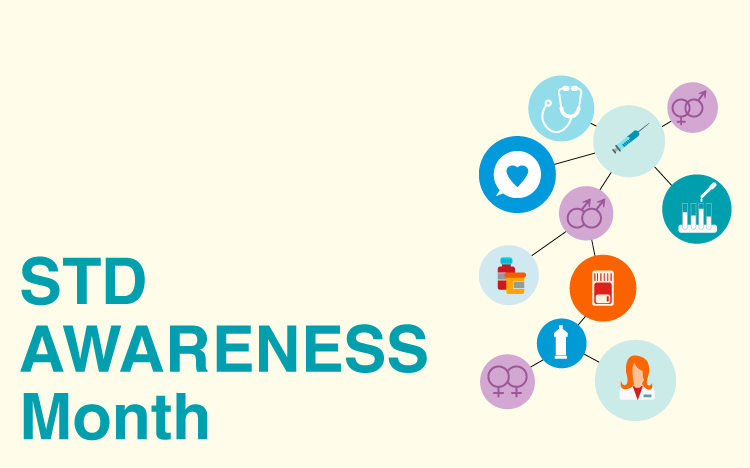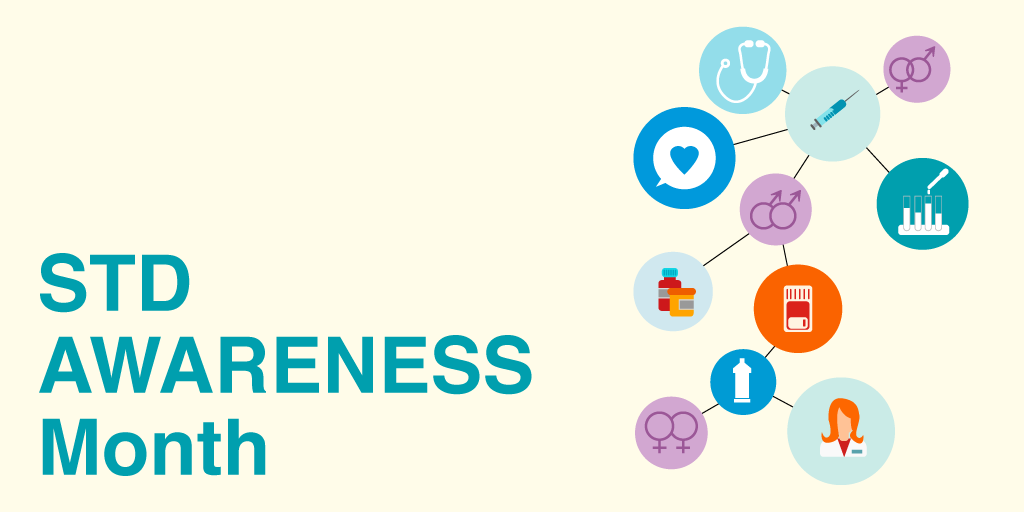April is Sexually Transmitted Diseases Awareness Month
April 16, 2018
April is STD Awareness Month
April is sexually transmitted disease awareness month. Every 6 months, if sexually active, one should get tested for diseases and infections. There is a large stigma against being tested. Firstly, no one wants to know they may have contracted an STD. But remember, it is important to start treatment prior to finding out.
Adding that most of these diseases come from sexual activity or intravenous drug use. People do not want to be honest with their doctor or a clinic about their lifestyle choices. It is important to get tested to be aware of what diseases are being passed, and to seek out the appropriate medical treatment. Getting tested greatly reduces the risk of passing an infection on to others, and can even help in the fight of reducing illness.
There are many STDs in existence. Some of them are merely inconveniences, and some completely disorient the body and slowly kill bodily functions. Gonorrhea, chlamydia, and syphilis are curable, meanwhile, HPV, herpes, hepatitis, and HIV/AIDS can only be treated. All of our information comes from the Mayo Clinic.
Gonorrhea
Gonorrhea is frequently found in the urethra, throat, or rectum, and can also be seen in the eyes. Gonorrhea usually has no symptoms, but sometimes they are present. Symptoms include pus-like discharge, painful urination, painful intercourse, pelvic pain and breakthrough menstrual bleeding not during the cycle. You may get septic arthritis, swollen lymph nodes, and discharge from your eyes.
Some complications may arise from gonorrhea. These include infertility in both women and men, infections in the joints, an increased risk of HIV/AIDs, and complications present in babies. Gonorrhea is usually cured with antibiotics.
Chlamydia
The symptoms of chlamydia are almost the same as they are in gonorrhea. Symptoms include painful urination, abdominal pain, painful intercourse, testicular pain and breakthrough menstrual bleeding. Always make sure to get tested if one of your partners reveals to you that they have contracted chlamydia or any of these STDs, also commonly called STIs.
The complications of chlamydia include pelvic inflammatory disease which can damage the female reproductive system. Infections can occur near testicles, prostate gland, and can ultimately cause infertility. Chlamydia is treated with antibiotics.
Syphilis
Syphilis has been around for a long time. Venereal diseases have been mentioned in the bible, recorded to have affected Civil War soldiers, and been a longstanding problem amongst prostitutes for centuries. Syphilis is present in four stages. Primary syphilis is a chancre sore. This sore will appear 3 weeks after infection and is usually not noticed. Secondary syphilis is a rash all over the body with a chance of hair loss and swollen lymph nodes. Tertiary syphilis can damage the brain, nerves, blood vessels, heart, eyes, and bones. Congenital syphilis is when a baby is infected during pregnancy. These babies can be born deaf, teeth deformities and other birth defects.
Syphilis can be treated with penicillin in the early stages. In the latent stages, syphilis will need to be treated with more doses of penicillin.
HPV
Human papillomavirus virus has over 100 varieties. There are vaccines that can protect against some strains. HPV can be presented as genital warts, common warts, plantar warts, flat warts, cervical cancer and precancerous changes to the cervix. There are some medications that can help treat HPV. HPV is not curable.
Herpes
Herpes is seen in HSV1, oral herpes, and HSV2, genital herpes. Most people with herpes will not know they have the infection. The most common symptom is red and white blisters. Pain and itching along with scabs are also common. Sore can be developed on any of the genital regions, or the mouth. Women can get sores on their cervix as well. Herpes is not curable and the medications commonly prescribed for treatment are Zovirax and Valtrex.
Hepatitis C
Hepatitis C is viral liver inflammation. Hepatitis is spread through contaminated blood commonly from intravenous drug use. The symptoms of Hepatitis C include itchy skin, dark urine, weight loss, fatigue, bleeding and bruising easily, with jaundice. Complications include liver cancer, liver failure, and the scarring of the liver commonly known as cirrhosis.
Recently, a cure for Hepatitis C has been introduced on the market, curing over 90% of people with Hepatitis C. Some people may still need to be on medications, and have a liver transplant. However, people with diseases with negative stigmas are less likely to be put high on the list of a transplant with the intent that they may abuse an organ if given one. If you have Hep C, you need to immediately stop drinking alcohol as it will continue to degrade the liver.
HIV/AIDS
HIV/AIDS is probably the scariest disease on this list. It is also the most lethal. Famous people who have or have had HIV include Eazy E, Keith Haring, Robert Mapplethorpe, Freddie Mercury, Liberace, Magic Johnson, Fela Kuti, and countless others. HIV first became public knowledge, and then an epidemic in the 1980’s. People were freaking out because scientists had not yet figured out that HIV is contractable through blood and other bodily fluids. The highest risks of HIV are from unprotected intercourse, and drug use, with a third of mothers transferring the disease to their baby through pregnancy.
HIV usually has no noticeable symptoms, which is why it is important to be tested. While the virus is fighting the immune system, some physiological changes may be apparent. Noticeable symptoms include fever, fatigue, weight loss, swollen lymph nodes, shingles. When HIV has progressed to AIDS, the symptoms are night sweats, chronic diarrhea, skin rashes, lesions, white spots, and recurring fever.
While AIDS weakens the immune system, it is usually an infection that actually kills the patient. These infections that are most lethal include tuberculosis, candidiasis, meningitis, toxoplasmosis, and cryptosporidiosis. People with AIDS may also die from Kaposi’s sarcoma which is a tumor on the blood vessel walls. There are some medications available for treatment, however, this is a lifelong disease.
Final Thoughts
As with any disease we write about, we highly encourage people to seek guidance from their primary care physician. It is important to practice safe sex, have a few number of partners, and use protection. Those who are sexually active it is recommended to get regularly tested. Please help to educate those around you and break the stigma associated with being tested. Testing helps to protect the person who carries the disease, and any partner they may come in contact with.
Explore Other Blog Items By Category
Recent Posts


Surgical Microscope Rentals


